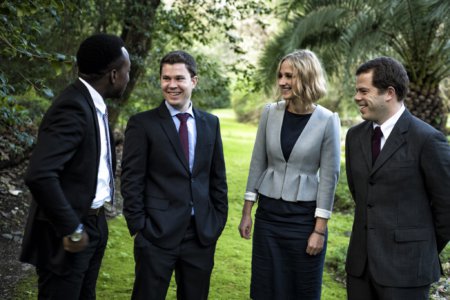Ivan Sokolov’s MBA search had two requirements: global recognition and a focus on sustainability. With stints in KPMG and EY helping companies understand the risks and opportunities arising from climate change, the Russian manager then knew which country stood out for its green transformation: Denmark.
Next, it was a matter of choosing a programme that offers critical insight into the admired Scandinavian business model – a model that prides itself on its ethical decision making, social responsibility and green agenda. The Copenhagen Full-time MBA fit the bill.
“Copenhagen is one of the few places where you can actually teach this in an authentic way, as the city itself and many of the businesses have sustainability high on their agenda,” explains Andreas Rasche, the programme’s Associate Dean and Professor of Business in Society at the Copenhagen Business School’s (CBS) Centre for Sustainability.
“We have a number of on-campus initiatives (e.g. to reduce waste and our emissions) and we have established reporting structures for this in the last few years. But a truly sustainable environment most of all implies that students themselves learn to think long-term and resist the allure of short-termism. At CBS, we offer them multiple opportunities to do exactly that.”
Sokolov’s foray into what UN Secretary General António Guterres calls “the defining task of the 21st century” is driven by a personal choice to make an impact. He believes society and business should collaborate to solve some of the world’s most urgent issues, such as climate change, poverty and rising inequality. CSR is one method that could help promote the concept of responsible corporate citizenship, placing business on the right path.
Copenhagen — green, innovative and progressive — provided the ideal learning laboratory for Sokolov’s MBA. “The programme focuses on the latest and most cutting-edge research in ESG and provides great placement opportunities for sustainability professionals,” he adds.
One of the highlights of his MBA was a presentation by the CEOs of some of the largest companies in Denmark, including his current firm DSV Panalpina. It was one of the many professional events organised by CBS. “CBS puts a lot of effort to connect new students with alumni and keeps the alumni network alive through events, lectures and informal networking sessions, which also enables a smooth arrival in Copenhagen,” Sokolov adds.
Established, triple-accredited and personalised
CBS is part of an exclusive group of business schools worldwide to hold the triple crown of international accreditations: AMBA, EQUIS and AACSB. This, along with the reputation it has solidly built over the years, signal to recruiters the distinctive value of its MBA.

Postgraduates learn to thrive in a global workforce through the building of broader networks. Source: Copenhagen Business School
This robust performance in international rankings and recognition is not surprising. Classes are small, led by world-class teaching staff. The cohort represents a dynamic array of different countries, cultures and professional backgrounds. “Everybody had a different view on certain topics and it was very insightful and enriching to discuss business topics with them,” Sokolov shares. “Additionally, the small class size encouraged friendships and I didn’t only get a professional network but also new friends.”
He could also speak directly to professors. “We are a rather small programme, usually having between 40 to 50 students per year,” explains Rasche. “So, we actually build quite personal relationships with our students.”
This allows immersive deep dives into the four concentrations — Digitalisation; Entrepreneurship; Finance; Governance and Sustainability — the Copenhagen MBA offers. “These concentrations reflect clusters of electives in certain areas where CBS possesses unique teaching and research strengths,” Rasche shares. Field case studies and management projects further bring theory to life.
The business school has had to adapt during these uncertain times. From last December to March, Danish regulations required it to shift classes online. “Obviously this required a shift in mindset from faculty as well as students,” Rasche says. “But, we coped well with the situation, I would say.”
Together with students, faculty members created solutions, such as additional workshops and amped up communication between students, faculty and MBA staff. “Right now, Denmark is reopening society and our MBAs are back in the classroom, though we still have to cope with some restrictions such as social distancing within the classroom. Luckily, Denmark has a very well-developed health infrastructure, so that students can get frequently tested.”
Applications are now open. Apply before June 10 (non-EU) or July 10 (EU). To learn more about how the Copenhagen MBA will challenge you, change you and boost your professional profile, click here.
Follow CBS MBA Programmes on Facebook, Twitter, Instagram, and LinkedIn












